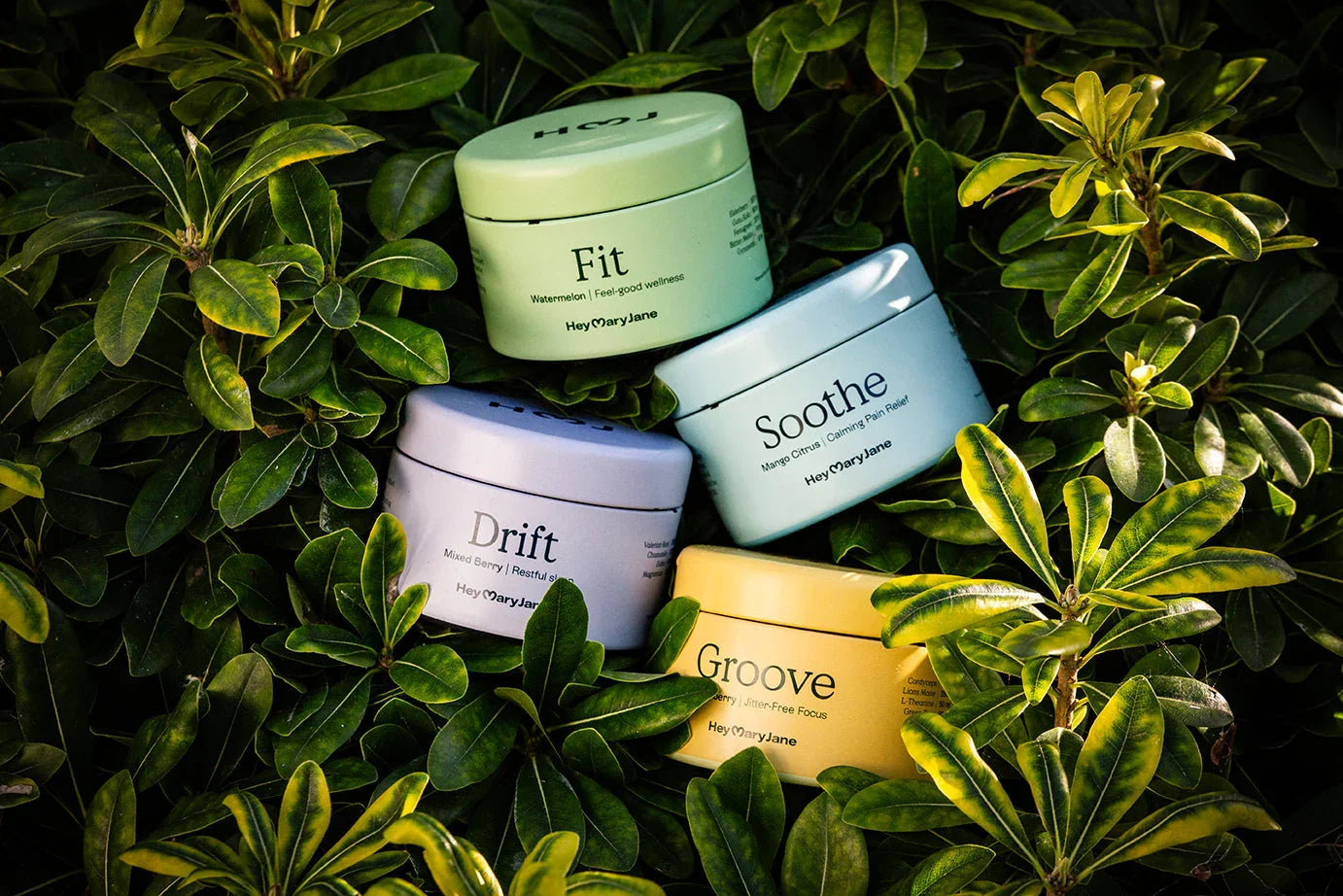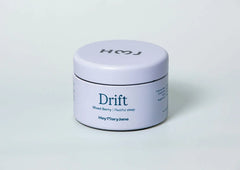I used to think sleep was something you either had or didn’t. When Lyme had me in its grip, I tried everything — melatonin, Ambien, a nightly glass of wine — and none of it worked. Melatonin left me foggy, Ambien disconnected me from myself, and wine just wrecked my nervous system even more.
The turning point came when I discovered microdosing cannabinoids. Not all cannabinoids — specifically, learning the difference between CBD and CBN. CBD steadied me during chaotic days, while CBN finally gave me the kind of restorative sleep I hadn’t felt in years. Together, they didn’t knock me out; they helped me reclaim my rhythm.
That’s why we’re diving into this comparison. Because if you’ve ever wondered whether CBD or CBN is right for you, the truth is both have unique strengths — and when used together, they can create a layered wellness toolkit that’s far more powerful than either on its own.
CBN vs. CBD: A Quick Cannabinoid Primer
CBD and CBN may look similar on paper — three little letters each — but their personalities couldn’t be more different.
- CBD: Your daily multitasker, the grounding ally that keeps stress, mood, and balance in check.
- CBN: The night watchman, gentle and steady, guiding your body into restorative rest.
They’re both non-intoxicating. They both come from hemp. But their origin stories and the ways they interact with your body explain why they feel so different in practice.
What Is CBD and Where Does It Come From?
CBD (cannabidiol) is everywhere — oils, tinctures, balms, gummies — and for good reason. It’s one of the most abundant cannabinoids in hemp and one of the most studied. Unlike THC, it doesn’t intoxicate you. Instead, CBD interacts indirectly with your endocannabinoid system (ECS), which helps regulate everything from mood to stress response to inflammation.
CBD doesn’t lock into receptors like THC does; it nudges your body into using its own endocannabinoids more effectively. That’s why it feels so versatile. It influences serotonin receptors (mood), vanilloid receptors (pain), and more, creating ripple effects that bring the body back toward balance.
For me, CBD was the grounding rope I clung to during Lyme flares. It didn’t erase my pain or stress, but it steadied me so I could keep going. That’s why it’s such a powerful ally for daily wellness — it helps you meet life where you are, with a little more clarity and calm.
The Origins Behind CBN
CBN (cannabinol) has a different backstory. It’s not abundant in fresh hemp plants. Instead, it develops when THC ages and oxidizes. Think of it as THC’s calmer, older cousin.
While research is still growing, early findings and anecdotal evidence show that CBN is closely tied to sleep. It binds gently to CB1 receptors in the brain, influencing how your body regulates rest without tipping into intoxication. The result? A subtle, natural sedative effect that helps you drift into sleep without the grogginess or dependency tied to traditional aids.
That’s why I built Drift around CBD + CBN. Melatonin left me with a “sleep hangover.” Drift gives me restorative rest I can actually trust.
Comparing Their Contributions
Here’s the simplest way to think about it:
- CBD = day. It’s your stress manager, your focus booster, your inflammation soother.
- CBN = night. It’s your mental chatter-quieting, body-softening, sleep-whispering guide.
Both are non-intoxicating, and both play well with others. Used together, they can create a daily rhythm that keeps you grounded by day and restored by night.
How Each Cannabinoid Interacts with Your Endocannabinoid System
CBN: A Gentle, Direct Connection
CBN’s molecular shape lets it bind gently to CB1 receptors in your brain. It’s weaker than THC, so no high, but it still influences the nervous system to ease you into relaxation. This explains why people often describe CBN as a “velvet curtain” closing on the day rather than a hammer knocking you out.
CBD: An Indirect but Wide-Reaching Influence
CBD doesn’t fit neatly into CB1 or CB2 receptors, so it works indirectly. Instead, it helps your body make fuller use of its own endocannabinoids. It also interacts with serotonin (mood) and vanilloid (pain), which explains its broad impact.
So while CBN is laser-focused on sleep, CBD spreads its influence across multiple systems, making it a daily multitasker.
Founder’s Take: How I Use Them Differently
Here’s what it looks like in real life:
- Morning: Fit for metabolism + CBD steadiness.
- Afternoon: Groove for focus (CBD + THCV + a dash of THC).
- Evening: Soothe for stress recovery (CBD + CBG + THC).
- Night: Drift for sleep (CBD + CBN + THC with calming botanicals).
This isn’t theoretical. It’s my actual rhythm — one that lets me function as a mom, a founder, and a human with a nervous system that doesn’t always play nice.
That’s why understanding CBN vs. CBD matters. Once you know their personalities, you can stack them intentionally instead of guessing.
Why Their Differences Matter
This isn’t just about science — it’s about how your life feels.
- Parents: CBD helps keep patience intact during chaos. CBN helps when you finally get to collapse into bed.
- Creatives: CBD sharpens focus and calms jitters; CBN resets the mind overnight so creativity flows fresh tomorrow.
- Athletes: CBD reduces inflammation and speeds recovery; CBN ensures deep sleep so muscles can rebuild.
- Perimenopause: CBD steadies mood swings; CBN soothes hormone-disrupted sleep.
- Professionals: CBD helps you handle stress and focus through back-to-back meetings; CBN lets you actually recharge after.
Real life requires both.
Potential Side Effects and Safety Considerations of CBN vs. CBD
Both cannabinoids are generally well tolerated. Here’s the rundown:
- CBD: Side effects are usually mild — dry mouth, digestive discomfort, appetite changes, or fatigue. At high doses, it may interact with medications like blood thinners.
- CBN: Less studied, but usually gentle. Reported side effects include dry mouth, appetite shifts, irritability, or next-day drowsiness. Some animal studies suggest possible fertility impacts in males, but more research is needed.
The golden rule? Start low, go slow, and pay attention to how your body responds. Microdosing makes that process easier.
Synergy and Best Practices: Taking CBD and CBN Together
When CBD and CBN work together, they amplify each other. This is called the entourage effect — cannabinoids unlocking more potential side by side than they ever could solo.
- CBD: Steadies mood, calms stress, supports focus.
- CBN: Eases you into sleep and quiets nighttime restlessness.
Together, they create a full-spectrum wellness arc. Add in botanicals like valerian root, chamomile, GABA, and magnesium, and you’ve got a formula that supports both body and mind【3】【4】【5】.
Pairing CBN with Adaptogenic Herbs
In Drift Sleep Gummies, CBD and CBN join forces with herbs and minerals that deepen their impact:
- Valerian root: Calms mental chatter【3】.
- Chamomile: Soothes the senses and eases tension【4】.
- GABA: Quietly hushes brain overactivity.
- Magnesium: Relaxes muscles and steadies the nervous system【5】.
It’s not just cannabinoids — it’s a symphony of plant allies, microdosed with precision.
CBN vs. CBD Guidelines to Maximize the Benefits
Here’s how to get the most out of them:
- Start with Microdoses: Pay attention to subtle shifts before increasing.
- Consistency Is Key: Cannabinoids work best as a ritual, not a one-off.
- Favor Full-Spectrum: Blends create richer, steadier effects.
- Time It Right: CBD by day, CBN by night.
- Demand Transparency: Always choose brands with published COAs.
- Pair with Lifestyle: Sleep hygiene, stress care, and nutrition amplify results.
Wellness isn’t a quick fix. It’s rhythm, consistency, and intention.
Final Thoughts
CBD and CBN are both powerful on their own. But together, they expand what’s possible: clarity by day, restoration by night.
For me, they’ve been more than cannabinoids. They’ve been part of reclaiming my body’s rhythm after years of dysregulation. And that’s why Hey Mary Jane exists — to share formulas rooted in nature, backed by science, and designed to fit your real life.
Because balance isn’t about hacks. It’s about rhythms you can actually count on.
Frequently Asked Questions About CBN vs. CBD
Can you use CBN and CBD together?
Absolutely. Many wellness seekers find that CBN and CBD work synergistically, enhancing relaxation, supporting deep sleep, and fostering balance. At Hey Mary Jane, our microdosed supplements are formulated for gentle, convenient stacking. Think of them like a well-tuned duo that amplifies each other's benefits. As always, start slowly and listen to your body.
Does CBD help with relaxation?
Yes, CBD is renowned for supporting a sense of calm and well-being without drowsiness or intoxication. Countless people turn to CBD to navigate daily stress, find focus, and wind down naturally after a long day. Our full-spectrum, plant-based blends make relaxation accessible and easy to dose.
Does CBN make you feel high?
No, neither CBN nor CBD makes you feel high. While CBN is a cannabinoid like THC, it does not cause a psychoactive "high." Instead, CBN is sought after for its gentle sedating qualities, helping users drift to sleep, not into a mind-altered state. It’s all about natural tranquility, not escapism.
Can CBN help with insomnia?
Early research and anecdotal reports are promising, as CBN has emerged as a natural sleep aid for many. People struggling with restlessness or insomnia often find CBN helps calm the mind and supports restorative sleep. As with any supplement, consistency and mindful experimentation are key.
Which is better for pain relief, CBN or CBD?
While CBN and CBD show promise for pain management, their effects may differ. For example, CBD is beloved for overall relief from everyday aches, inflammation, and chronic discomfort. On the other hand, CBN may offer more targeted help with conditions involving sleep disturbances or nighttime pain. Our perfectly microdosed formulas empower you to find your own sweet spot.
How long can the effects of CBD last?
Depending on your individual biology, dosage, and product type, CBD’s effects can last from 2 to 6 hours. Hey Mary Jane’s products are crafted for steady, reliable support—no rollercoaster rides, just gentle relief that fits effortlessly into your daily routine.
How long can the effects of CBN last?
Similar to CBD’s durations, CBN’s soothing effects typically last 4 to 6 hours, making it an ideal companion for bedtime or winding down in the evening. Our expertly balanced blends are designed for consistency, so you can count on support when you need it most, night after night.
Sources:
- CannaMD.How to microdose marijuana
- WebMD.Health benefits of valerian root
- WebMD.Chamomile Supplement Guide
- Shmerling, R. H. (2025, June 3).What can magnesium do for you and how much do you need? Harvard Health Publishing
- Salha, M., Adenusi, H., Dupuis, J. H., et al. (2023). Bioactivity of the cannabigerol cannabinoid and its analogues–the role of 3-dimensional conformation. Organic & Biomolecular Chemistry, 21(22), 4683-4693.
- WebMD.CBD vs. CBN: What is the difference?







